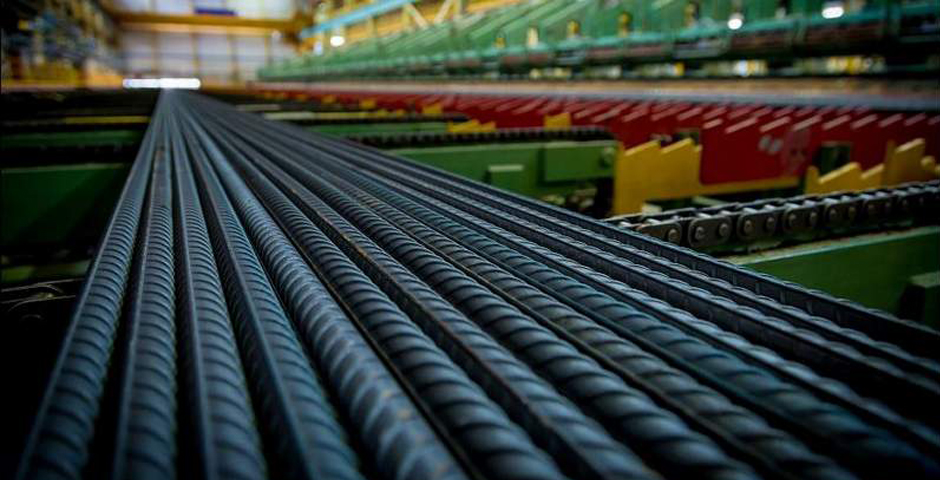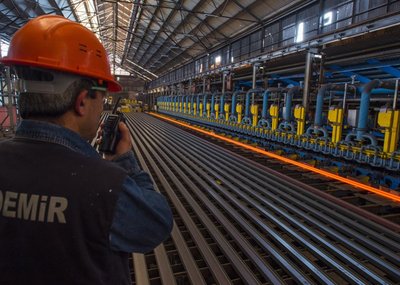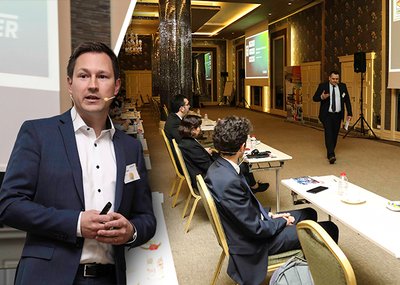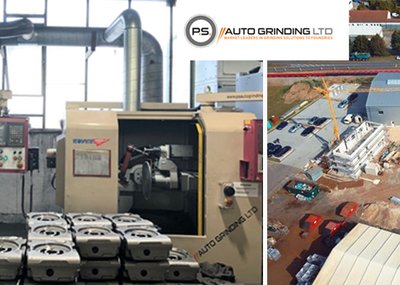According to reports by the Turkish Steel Exporters’ Association, currently there are 26 electric arc furnace, 11 induction furnace and 3 basic oxygen furnace steel plants in Turkey. The steel manufactured in local factories is a vital source material both for the country’s and the global economy. Together with Turkish iron, steel is globally recognized as a high-quality metal with good prices.
The latest reports by the Turkish Steel Exporters’ Association show that worldwide steel production in 2021 increased by 3,7% compared to 2020, reaching 1,95 billion tons. Turkey’s steel production registered even more distinctive growth in 2021 – by 12,7%, reaching 40,4 million tons.
“All steel businesses operating in Turkey are private enterprises that regularly monitor technical changes in order to strengthen the country’s industry’s long-term position in the global market. The steel industry, one of our country’s most developed industries, is now the fourth greatest contributor to the Turkish economy”, the Association’s website informs.
Trade partnerships and key facts
Considering the opportunities for importing steel from Turkey, we should mention that the country’s economy has been significantly revived over the last years, namely due to its production of iron and building materials. In terms of quality Turkish iron has outperformed China, Russia, Italy and Germany. Moreover, the sector is going through a massive modernization, clearly visible especially in production of the finest types of construction iron.
Global customers of Turkish iron must go through a specific procedure to be able to import from the country. They need to have a commercial register that proves the identity of an owned company and also obtain a license to work in the field of importing iron and steel. The companies need a tax card and a letter from a bank stating that they are going to transfer a particular amount out of the country. A special agreement needs to be made with a customs clearance company to help deliver the iron into the importing country. The importers are also obliged to maintain the standards that are applicable to the specifications of the products that will be purchased.
According to the Turkish Steel Exporters’ Association, Turkey is currently the world’s largest rebar exporter, the world’s 7th largest steel producer. It is also the world’s 6th biggest steel exporter and Europe’s largest steel producer. Moreover, Turkey exports steel and steel products to a total of 193 countries. 72% of the steel production is from steel scrap. Furthermore, Turkey is the world’s largest importer of scrap metal. In 2021 the total crude steel production in the country amounted to 40,4 million tons.
Raw material processing in Turkey
According to the Turkish Ministry of Trade, iron factories in the country are considered one of the reasons for Turkey’s progress and access to development in all fields. Some of the most important companies among the steel manufacturers in Turkey are: Iskenderun Iron and Steel Co. Inc.; Eregli Iron and Steel Factories TAS.; Icdac Celik Energy Shipyard and Transportation Industry Inc.; Colakoglu Metallurgy A.S.; Toscelik Profile and Sheet Industry Inc.; Borcelik Celik San. Trade Inc.; Kardemir Karabuk Iron and Steel Industry. ve Tic. Inc.; Kroman Celik Sanayii A.S.; Assan Aluminum San. ve Tic. Inc.; Bastug Metallurgy Industry Inc.; Izmir Iron and Steel Industry Inc.; Borusan Mannesmann Boru San. ve Tic. Inc.; Kaptan Iron and Steel Industry and Trade Inc.; Koc Metallurgy A.S.; etc.
Turkpidya - the online encyclopedia, dedicated to the Turkish economy, history and culture, published an article, describing the principles of raw material processing in the country. The process starts with delivering iron ore and coal, which are the main raw materials, to the facilities and keeping them ready.
The arrival of raw materials at the facility initiates the production stages. The coal is sent to the factories for preparation, and the fine ore is delivered to the sinter plant for preparation for use in the blast furnaces. Next, the coal is carried to the furnaces and turned into coke at high temperatures and in an oxygen-free atmosphere after being delivered to the coke plant silo using the requisite systems. Coke for blast furnaces is manufactured in this manner. Powdered ore and ferrous flue dusts are ground to a size suitable for use in sinter plants. Belt systems transport the product ready for iron and steel blast furnaces. Blast furnaces create liquid raw iron. Iron ore, pellets, coke, and sinter are utilized as inputs in the manufacturing of liquid raw iron.
The sulfur from the collected liquid raw iron is cleansed and transferred to the steel mill for use in manufacturing. Various techniques are used in the process to turn liquid raw iron into liquid steel. Next the liquid steel produced is shaped in the casting facilities and thus coils and sheets are produced. After being prepared to meet the needs of the customers, coils produced in hot rolling mills are cooled and transported.
Steel production - history and development
In 2019 the Ministry of Trade of the Republic of Turkey published a paper on steel manufacturing development in the country. According to the document, as the iron and steel industry supplies input to almost all manufacturing sectors, it plays an important role in the industrialization and development of Turkey.
“The foundations of the Turkish industrialization were laid in the 1930s. The first integrated Iron and Steel Works (Kardermir) facility began to operate in Karabuk in 1939 when Turkey produced raw steel for the first time. In order to meet the demand for flat products, the second integrated plant, Eregli Iron and Steel Works (Erdemir) started production in 1965. In 1977, Iskenderun Iron and Steel Works (Isdemir), Turkey’s third integrated steel mill, came into operation to meet the demand for long products and semi-products. After the ’80s, investments for the production of iron and steel by electric arc furnaces started. The takeover of Isdemir by Erdemir on condition of its conversion to flat products, which occurred as a result of liberalization in economic activities, was the most important and recent development in the Turkish steel sector. The privatization of Isdemir in 2002, which was the last state-owned facility, is also important as it steered the Turkish iron and steel industry to be entirely operated by the private sector”, the paper informs.
Today the Turkish steel industry operates 19 electric arc furnaces and three integrated works, (Kardermir, Erdemir, Isdemir) with a total raw steel production capacity of nearly 51,8 million tons per year. “In 2015 Turkey had a steel production capacity totaling 55,9 million tons, out of which some 39,1 million tons or 69,5% was for long-steel products that are mostly used in the construction sector. 16,8 million tons or 30,5% of the raw steel capacity is directed to flat products”, the document further explains.
According to data, published by the Turkish trade ministry, raw steel production in the country rose to 37,5 million tons and Turkey ranked the 8th largest steel producing country in the world by the end of 2017. By product type, 68,9% of total steel production was directed to long products and about 31,1% was for flat products in 2017. In terms of the production processes, 69,2% was electric arc furnace steel.
“With the rise of new investment projects and capacity increases to production of flat steel products, the flat/long steel production imbalance in Turkish steel industry has begun to change. While flat products’ share in total raw steel production was 14% in 2007, the share rose to 29% in 2015 and while long products’ share in total raw steel production was 86% in 2007, the share declined to 71% in 2015", public information also states.
Developments in the iron and steel industry have direct influence on the growth of production in iron or steel products. At present Turkey produces a wide range of iron and steel articles, which meet almost all of the domestic demand. Among iron or steel products, casting products and steel pipes and tubes have significant importance. In kitchenware and industrial kitchen products, Turkey has built a considerable capacity in recent years and has increased the exports of these items.
“With the continuous demand generated by the Turkish manufacturing industry, the casting and forgings industry of Turkey has experienced booming development both intechnology and in market.
Turkish foundries, which are able to produce every kind of alloyed or unalloyed ferrous castings, specialize in the production of cast parts for domestic industries. Concerning the geographical distribution of the sector, the major foundries, which are all privately-owned, are located in Istanbul, Kocaeli, Bursa, Eskisehir, Bilecik, Izmir and Ankara. Small scale family-owned casting companies are widely spread in almost all regions of Turkey. The remarkable increase in casting production and exports is due to the increasing domestic and world demand and government policies which encouraged many entrepreneurs to invest in the foundry sector”, the trade ministry further explains.
In recent years Turkish foundry specialists have managed to improve productivity with the use of new technologies and achieve low production cost with high quality. The developing Turkish foundry industry is currently in a phase of expansion and aims production at international standards. The casting industry in Turkey comprises of 1200 small, medium and large-sized foundries.
Export capacities of the Turkish steel industry
Reasonable pricing and efficient marketing help local manufacturing companies export their production all over the world. The European Union was Turkey’s major export market in 2021, accounting for 7,4 million tons, or 31% of the total steel exports. Another important market for Turkish steel and steel products is the Middle East area. Exports there fell by 10,9 percent in 2021 to 4,3 million tons, statistics show. The most significant growth in Turkish steel exports in terms of tonnage was to the Latin America area in 2021, with a rate of 103 percent. This region was the third with the biggest export volume with 3,1 million tons over the last year. Steel shipments from Turkey to North America recovered in value in 2021 and reached 1,9 million tons. Meanwhile, exports to North Africa fell 12,3 percent to 1,8 million tons over the same year.
Having in mind the positive direction of the country’s economy development in common, the iron and steel industry has demonstrated a distinctive growth in both exports and domestic demand. Iron and steel exports of Turkey include pig iron, scrap, flat steel, billet, bloom, flat products, long products, special steel products, pipes and tubes, pipe fittings, elements and parts, stranded wipes and ropes, screws, bolts, stows, barbecues, radiators, kitchen articles, etc.
“Iron and steel long products with an export value of USD 7,1 billion were the largest product group in sector exports in 2017. Flat products with an export value of USD 1,8 billion were one of the largest product groups. Iron and steel pipes exports also ranked high with a value of USD 1,6 billion in 2015. The other important iron and steel products in exports were steel billets (USD 1,5 billion) and structural steel and parts (USD 1,1 million)”, the Trade Ministry report informs.
The main iron and steel exports of Turkey by country (measured in millions of US dollars) are to: USA, Iraq, UAE, Egypt, Germany, The United Kingdom, Israel, Turkmenistan, Romania, Italy, Algeria, Saudi Arabia, Morocco Ethiopia, France, Spain, Azerbaijan, The Netherlands, Yemen and Iran.
Modern Turkish steel industry
In 1996, The European Coal and Steel Community (ECSC) agreement was signed between the EU and Turkey. With signing the agreement, customs duties on bilateral steel trade were abolished. The agreement allows Turkey to trade its iron and steel products without customs duty with all EU member states. Additionally, the Government does not subsidize Turkish domestic steel industry due to the European Coal and Steel Community (ECSC) agreement, the Turkish Ministry of Trade reports in a current paper.
All steel companies in the country are privately held. Turkish steelmakers continue to pursue technological developments to enhance the long-term viability of the industry in the global marketplace. The steel industry has become one of the most developed sectors in Turkey and today counts as the fourth largest contributor to the Turkish economy, official data shows.
After 1980, with the implementation of import substitution system, Turkey has increased its steel export to primarily neighboring countries such as Iran, Iraq and North African states. In the next 20 years, Turkey has realized a major production and export boom, the trade ministry points out.
“While Turkey was the world’s 10th biggest steel producer in 2001, the country has become the 7th biggest producer globally and the largest steel producer in Europe in 2020. In fact, it was the third fastest growing steel producer in the world between 2001 and 2011, after China and India. Steel production in Turkey has increased significantly since 2001, growing from 15 million tons (mt) in 2001 to 40,4 million tons in 2021. Growth of the industry has been driven by strong domestic consumption. Turkey’s crude steel consumption has increased by 13,2% to 33,4 million tons in 2021 and is expected to continue to grow in the medium and long term. In addition to the strong domestic demand and dynamic steel using industries, Turkey’s well placed position also supports exports and production”, the also report says.
Branch organizations
The Turkish Steel Exporters’ Association (TSA) is one of 6 associations, which have been operating under the body of General Secretariat of Istanbul Mineral and Metals Exporters’ Association (IMMIB). Established in 2005, today it has a total of 2280 members, which contribute with 40,4 million tons of steel to the total production of the country.
The Association is a non-profit business organization of different-sized companies representing the largest steel producers and exporters in the Turkish steel industry. It carries on its operations with the aim of increasing the export potential of the Turkish steel industry and paves the way for Turkish steel producers/exporters, with main objective to foster and attain sustainable global steel market based on free and fair trade. The Association also solves the problems its member companies face at home and abroad, provides contact between members and foreign importers in order to ease the export processes, provides up-to-date domestic and global market news, reports and analyses.
According to the website of the Association, its mission includes developing and implementing the strategies in order to increase the share of the Turkish steel exports in global markets and to maintain a sustainable global competitive strength. The organization aims to guide and assist the members of the Turkish steel sector to become a leading factor in the global steel trade.
TSA has been working on many different activities in order to increase its place in the world steel market. In parallel with this purpose, it especially carries out the following activities: market research, organizing international B2B meetings, national and international PR activities, export promotion, consulting and assistance for the Turkish steel industry, and providing support in international trade disputes.
The Turkish Steel Exporter’s Association is a business association and it is a media partner of many national and international conferences. By promoting these events, the association provides various benefits to its members and partners.
“Cooperating is one of the most important features in this rapidly increasing competitive environment. For this reason, the Turkish Steel Exporters’ Association connects a significant portion of Turkish steel exporters with the world in order to enhance Turkish steel’s capacity in foreign markets”, TSA’s website also states.
The Steel Exporters’ Association carries out its operations with the aim of increasing the export potential of the Turkish steel industry and it supports Turkish steel producers/exporters with its main objective to foster and attain sustainable global steel market based on free and fair trade, the association further explains.





